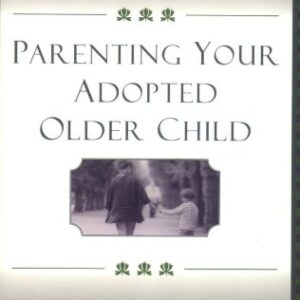If It Isn’t One Thing, It’s Another
By Brenda McCreight
I often feel that being the mother of 14 children is enough of a challenge. My kids present me with something to new to adapt to on a daily basis. And, the social, academic, and emotional stresses that confront my children each day makes them develop a pretty high level of adapting skills so that they can navigate their way through their pre-existing fasd, the ptsd, the adhd, as well as all the new things that life in an adoptive family demands of them.
Indeed, life doesn’t seem to give people much time to sit back and rest on their laurels, or their haunches, or their past successes, or their current methods. Whether we like it or not, there always seems to be one more thing coming from around the corner to force us into some kind of unwanted, or unanticipated, change. And by change, I don’t just mean the everyday chaos that we are pushed into when children come home, leaving their clothes and toys around, causing a total mess of things that can only be cleaned up with help from an Austin cleaning service or something like that. I mean the emotional and mental changes that we as a family need to cope with and remain standing strong through all of it. And, even those of us who have adopted challenging children aren’t going to be spared from the stress and aggravation that invades us from the world outside our home.
Changing Shape, Not Bouncing Back
The term “resilient” is often used to describe children who have tough pre-adoption experiences yet still manage to integrate into their final home with their new adoptive family. I bet when you adopted your child(ren) the social workers said “Don’t worry about little Jimmy, he’s a very resilient child”. That same term is often applied to adoptive families – we are told that we will have to be “resilient” in order to cope with behaviors that our newly adopted child may present. However, resilience implies that individuals, or families, can return to the same shape they were in before the big event, that they can look or feel unchanged by what has happened. It implies that our newly adopted child is going to bounce back into some kind of neuro and emotional health that in fact, he never had to begin with. And, it implies that we, as adoptive parents, can bring a new child into our family without being transformed by the experience.
– Helen Keller
The truth is, that events or situations that are big enough to impact our lives, such as being adopted or adopting a child, are going to leave us profoundly changed, and I’ve found in life that trying to get back to who we were before the adoption doesn’t work. What does work is jumping on board with the change and transformation and developing the characteristic of adaptability.
A long, long time ago, but not very far away, I was in my first year of university, where I met a woman who had returned to university after her children were grown. She had been prodded to do so by the memory of her most interesting mother-in-law. This mother-in-law was born to poor farmers in Eastern Europe. She never learned how to read or write, but she knew how to cook and clean. When her parents and most of her siblings died from a flu epidemic, she had to find someone to marry, or she would starve. The only man interested in her at the time was an equally poor young orphan with no prospects. They soon had four sons, and were barely managing to scratch out a living, when one day, for reasons that no one ever knew, the husband failed to return home from the fields where he worked as a day laborer. He may have wondered away to find some other poor young woman, or, he may have met with foul play – whatever happened, he didn’t come home and this young widow was left with no money, no property, no family, and four little boys to feed.
She hung around her little cottage for a few weeks, hoping the husband would find his way home, but, finally, the landlord evicted them. She realized that waiting for things to go back to normal was not going to work (and, it didn’t sound to me like ‘normal’ was all that great anyway). She had to do something soon, or they would all die. She didn’t like the idea of finding another man with no prospects to marry, so, with no skills other than keeping her boys alive on nothing, she decided that their only hope was to seek the shelter of her only surviving family, an older brother who had, years before, immigrated to Scotland. She wasn’t sure exactly where Scotland was, and she had no money to travel there. But, that didn’t stop her. Instead, she adapted to her new level of poverty, and her need to travel to unknown lands, and she made plans.
– Charles Dickens
She sold what little she had to buy boots for her boys and herself, packed up her cooking pot and kettle, then she started walking. She went from village to village, working as a cook here, a tavern cleaner there. The older boys (about ages 6 and 7 at the time) hired on as errand boys and floor sweepers. When she had enough money for food, and sometimes even enough for a train, they would move on again.
This woman adapted everywhere she went. Walking across Europe, she adapted to language and soon learned enough of each language to ask for a bit of work, a place to sleep, and the directions to Scotland. She adapted to different customs, to different weather, to dangers of life on the road, and she adapted to being alone and to being the sole parent to her little boys.
They kept walking, and four years later, she was knocking on the door of her brother’s apartment in Glasgow, Scotland. By that time, this illiterate woman was fluent in French, German, and English. She had acquired enough skills to find work easily, and she knew the geography of Europe better than a modern day travel guide.
She also decided that she was going to ensure that her sons never had to go through this type of experience again, and in order to make them more adaptable, she made sure they had all the advantages of the British education system. One of her sons grew up to be the CEO of a national bank, another became the CEO of an international airline, and another became a successful neurosurgeon. I can’t recall what the fourth son did, but I do remember that it was equally impressive.
Most of us will never have to adapt like this incredible woman did. But, since I first heard of her story, she had been my role model for adaptability. If one poor, illiterate woman can do what she did, imagine your capacity for adaptation.
Loss brings grief. When families have to adapt to big changes, they often experience grief over the things they have lost or had to let go of. Grieving, while normal, necessary, and the only road to recovering from loss, is a debilitating process. It drains energy and disrupts normal behaviors and thought processes. Take care of each other while this is happening. Give your children (the children already in your home and the newly adopted child) and your spouse some time and emotional support so that they can move through their grief at their own pace. Don’t be afraid to let them know that you need the same in return.
Go with the flow. When change happens, whether it is good or bad, start looking for ways to adapt right away instead of spending time and energy trying to force things back the way they were. If your once well behaved daughter has recently starting wearing black and dating boys with shaved eyebrows (whoops, there goes my life sneaking in), don’t spend time trying to get her back into blue jeans and arguing about her choice in men. Instead, start finding out how she understands her life now, and how you can still be a safe and stable part of it.
Turn to each other first. Change brings about stress, and stress can bring about estrangement and isolation. Reach out to your spouse and your children. Make that extra bit of effort to let them know you are still there for them and that you believe the family will get through this challenge.
Use family meetings. Family meetings will give all of you a means of talking about what is going on, how each is being affected, and sharing ideas or plans for adapting.
Seek support elsewhere. That’s right, you don’t have to be everything to each other in order to be a strong family. Take some of your issues to people who have the skills to help all of you. A counselor, a pastor, a relative, or someone who will look at your family as a whole unit and can provide either support or information on how to manage this difficult time.
Make health a priority. When the going gets tough, the tough get sick. Health is generally the first to go when families are under stress or coping with change. As an ongoing preventative measure, try to exercise regularly and increase the good habits while decreasing the bad ones. If you don’t already do this, start as soon as you realize that change is coming your way. Give the kids their daily vitamins, stack
the dinner plate with vegetables, take the dog for a walk every night.
Itemize the good things in your life. When the bad times hit, it is important to take the time to make a list of the good things in your life. Ask the children to contribute to this list. No matter how bad things are, as long as you are all breathing, there is still some good and still some strength to help you hang in there together.
Think outside of the box. This is a good, albeit overworked, phrase. Change means that something different is happening in your life, so you have to come up with some different ways of living your life. It may be that simple, small ways will suffice. Or, it may mean that this is the time for big leaps.
Look at how other people live. Take a look at life styles that are really different than your own and see if there is any appeal in it for you should you ever have to make major change. If you live a busy city life, find a group of people who have made simple living a lifestyle and check out how they did it.
Discuss alternate plans before they are needed. Lots of couples, and families, talk about “what if we…..”. Use those discussions to consider how you could change your life if a variety of different scenarios arose. What could you do if you lost your job? How would you cope if one of you died? If one of you ran off with a rich, tanned, buff, tennis instructor (are they ever rich?). If a serious, global, economic downtown started to hit home to you?
Jettison the extra cargo. Most families have too much to do on a daily basis. When hard times hit, let go of whatever you can. Cut out activities that are not family related and are unnecessary to your life so that you have more time and more energy for your spouse and children.
Ask your children to contribute ideas for change. Ask the kids if they have ever thought of other places they would like to live – other than Disneyland. You may be surprised at how creative and realistic your children can be when it comes to considering other ways for your family to live.
Drop your standards a little. If you are all worried because mom has to stay home with the newly adopted child and your family can’t make it on one income, this is the time to forget whether the dinner dishes get done, and instead, take the time to play a board game with your worried children. Pick the children up from school and go for a swim at the local pool or lake and forget about the homework or the lawn that needs mowing.
You probably know the old story about the tree that bends in the wind remains standing while the tree that stays straight gets ripped out by the roots and flung across the landscape like an old kite. Well, even that bendy tree lost some leaves and a little bark. And like that tree, you cannot expect to remain untouched by the change that adoption brings to you and the child . Adapting to the change that newly placed adopted child brings, instead of pretending it isn’t happening, or that you can go back to the way you were when it is over, is simply not going to work. However, you will find that adapting to change will make your family stronger, not weaker, and that you can do so without losing sight of who you are or what values you want to live.
–Tom Kimmel and Michael Lille
About the Author

Brenda McCreight, Ph.D., is a therapist, author, and consultant specializing in services for adoptive and foster families dealing with challenges such as FASD, ADHD, conduct disorder, attachment disorder, developmental delays, and cognitive impairment.
Brenda is the author of “Recognizing and Managing Children with Fetal Alcohol/Syndrome” published by the Child Welfare League of America, and of “Parenting Your Older Adopted Child” published by New Harbinger Publications and “Eden’s Secret Journal: The Story of an Older Child Adoption” published by Adoption Press.
Brenda sees clients at her office in Nanaimo, British Columbia and she provides distance parent coaching by phone and by email. Most importantly, she is the mother of fourteen children (12 by adoption) and seven grandchildren.
She can be contacted through her web site: http://www.theadoptioncounselor.com





